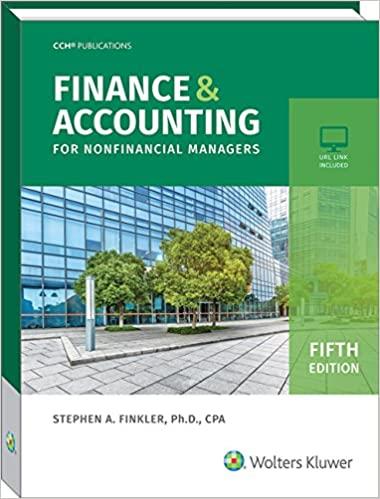Question
(g) Alfred employed as the governing director of a company under a contract which specified his term to be of ten years' duration and that
(g) Alfred employed as the governing director of a company under a contract which specified his term to be of ten years' duration and that his remuneration was to be at the rate of 12.5% of net profits. The company disposed of its business and Alfreds' services were dispensed with. It was agreed between the company and Alfred that the sum of $25,000 being 12.5% of the company's estimated net profits in the unexpired term of ten years, should be paid to him, in monthly instalments, as compensation. Are the monthly instalment assessable income for Alfred? Explain.
(h) William sold wines manufactured by Nelson Winery in South Island New Zealand. Under an agreement Nelson Winery agrees to give to William retail distributing rights (but not a sole agency) for the sale of the wines in South island new Zealand. In the winter of 2019, William took a holiday of about a week's duration in an island in the Pacific Ocean. Nelson Winery paid for the charges for transportation and accommodation for the holiday. The holiday was a participation in a ``holiday scheme'' controlled by Nelson Winery and was a discretionary and gratuitous benevolence to those who satisfactorily performed agreements with the company. According to the agreement the holiday period is to be approximately one week taken during the months of June and July unless the Committee otherwise determines. No cash payment in lieu of the holiday trip will be made. William must be a fully effective Retailer at the time of the holiday trip and will receive one ticket for himself and one ticket for his wife for the holiday trip. He is not at liberty to transfer either ticket to any other person but must go himself and take his wife. William is expected to promote sales in the Territory franchised to him. The IR Commissioner added to the aggregate of assessable income in respect of Williams holiday that amount which the manufacturer expended in payment for the transport and accommodation provided to the respondent in respect of that holiday. Is the holiday accommodation and transportation costs paid by Neson Winery assessable income for William? Explain.
(i) Farm Limited, the ultimate holding company of the companies in the Super Dairy Group, disposed of a number of its subsidiary companies, including the companies in the Super Dairy Group. Jean, a general manager of Minor Dairy Limited, a company in the Super Dairy Group, received an offer from Farm limited of a one-off payment of $110,000 (retention payment) to remain in her current employment with Minor Dairy Limited for a period of twelve months from the effective date of the forthcoming change of ownership of Super Dairy Group in which Jean was engaged and required to give full time attention, commitment and energy to the business of Super Dairy Group during that time. In the event that Jean resigns her employment with Super Dairy Group before the completion of twelve months' service following the change of ownership, she is to refund to the Company the amount paid to her, less an abatement of one-twelfth of the total retention payment paid to her for each completed month of service or part thereof. No such refund will be payable if Super Dairy Group terminates her employment or she dies or become permanently disabled before the expiry of the 12 month retention period. Jean accepts the offer and the retention sum was paid to her. Is the retention sum assessable income for Jean? Explain.
(j) The taxpayers Mr Grieve and his wife purchased a rundown farming property of 216 acres for $33,000 in 1969. They formed a partnership with the intention of carrying on a farming business. When they acquired the land, it was not in a suitable condition for farming as the land was heavily infested with gorse, the pastures had deteriorated and the fencing was not in place. They had problems to improve the land because it was surrounded by a forestry area and a wine yard. Mr Grieve put lots of efforts to improve the land slowly and established a Hereford stud herd (of a modest size in 1980 with the intention to bring some profit to them. He worked full-time in the farm and his son joined him as full-time worker from 1975 to 1977. The partnership had made losses from 1972 to 1977. However, only losses from 1972 to 1975 were allowed to be offset against their other income. The Commissioner disallowed the losses in 1976 and 1977 as they said the taxpayers were not carrying on a business in those years. Taxpayers claimed that they had put in time and efforts to slowly improve the land with the intention to make profit from it. Thus, he was carrying on a farming business and losses should be allowed. Discuss whether the partnership was carrying on a business activity in 1976 and 1977 and whether the losses should be allowed. .
Step by Step Solution
There are 3 Steps involved in it
Step: 1

Get Instant Access to Expert-Tailored Solutions
See step-by-step solutions with expert insights and AI powered tools for academic success
Step: 2

Step: 3

Ace Your Homework with AI
Get the answers you need in no time with our AI-driven, step-by-step assistance
Get Started


